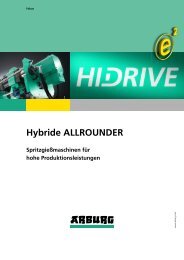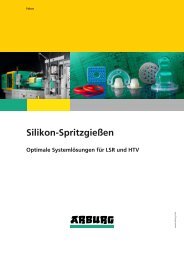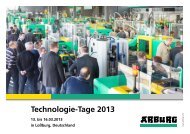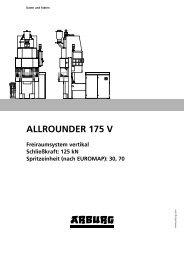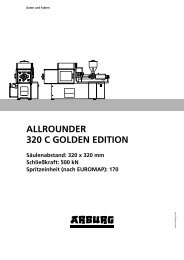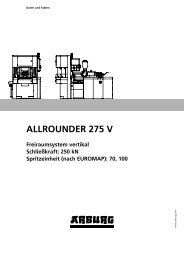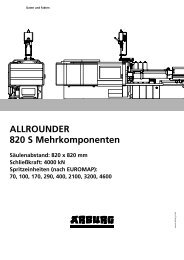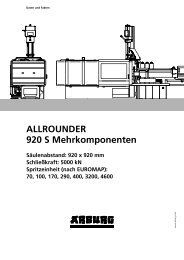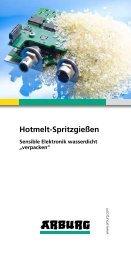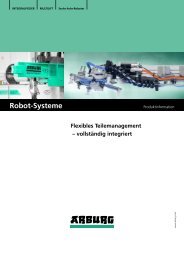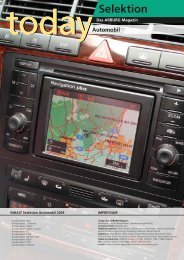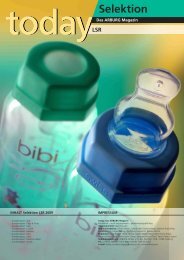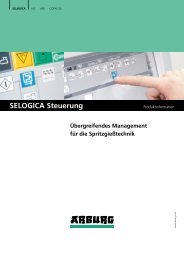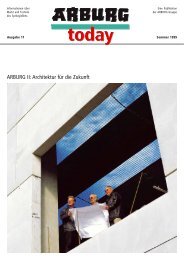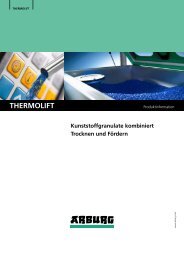GB - Arburg
GB - Arburg
GB - Arburg
Create successful ePaper yourself
Turn your PDF publications into a flip-book with our unique Google optimized e-Paper software.
ALLROUNDER for<br />
TU in Clausthal<br />
The Institute for Polymer<br />
Materials and Plastics Engineering<br />
(PuK) at the<br />
Technological University in<br />
Clausthal uses two ARBURG<br />
ALLROUNDERs for teaching<br />
and research purposes. To<br />
gain an insight into the enormous<br />
scope for using and<br />
processing polymer materials,<br />
the head of state for Lower<br />
Saxony, Sigmar Gabriel, visited<br />
the institute at the beginning<br />
of March.<br />
Founded in the winter semester<br />
of 1998/99, the director of the<br />
institute, Prof. Dr. Ing. Gerhard<br />
Ziegmann, has managed to establish<br />
impressive working structures,<br />
even in terms of the equipment<br />
available to them, in quite a short<br />
space oftime.<br />
For its work in single and multi-component<br />
injection moulding,<br />
the institute has turned to the<br />
ARBURG ALLROUNDER. ARBURG<br />
supplemented their purchase of an<br />
ALLROUNDER 420 C 1000-150/60,<br />
used to produce injection moulded<br />
parts using two components,<br />
with the loan of a type 320 C<br />
600-250 machine to cater for conventional<br />
injection moulding of<br />
plastics. At the institute, the two<br />
ALLROUNDERs are used in all the<br />
different areas such as multi-com-<br />
Lower Saxony's head of state, Sigmar Gabriel (3rd from left), gave the signal to start production using the<br />
ALLROUNDERs. Joining him in the celebrations were (from the left): Michael Bosse and Prof. Gerhard<br />
Ziegmann (from the PuK), and Haiko Tessendorff and Wolfgang Knop (from ARBURG).<br />
ponent injection moulding, including<br />
for hard-soft combinations, ceramic<br />
and powder injection moulding<br />
or for processing polymers<br />
fi lled with magnetic powder.<br />
The state president appeared<br />
impressed by the institute's capabilities,<br />
its facilities and the variety<br />
of technology used. He was<br />
also very impressed by the material<br />
itself and the number of applications<br />
that can be found for it<br />
in everyday life.<br />
Making best use of the<br />
capacity and fl exibility<br />
of an existing<br />
machine fl eet can give even<br />
the small injection moulding<br />
company that competitive<br />
edge. This necessitates the increased<br />
use of data processing<br />
systems such as the ARBURG<br />
host computer system ALS 4.0,<br />
which records machine and<br />
batch data and thereby makes<br />
the whole manufacturing sequence<br />
more transparent.<br />
To exploit the potential for optimising<br />
production, it is vital to<br />
establish effective monitoring and<br />
documentation of the whole production<br />
process. Even the basic platform<br />
of the modular host computer<br />
system provides an up-to-date overview<br />
of the production currently<br />
taking place, being connected to<br />
the machines via the recognised<br />
world standard of Ethernet cabling<br />
network.<br />
Using the machine and plant<br />
data acquisition facilities of this basic<br />
system, the user of an ALS Workstation<br />
can keep constantly upto-date<br />
on production within the<br />
company. Starting with a graphic<br />
representation of the machine hall,<br />
it is possible to call up detailed information<br />
such as status data, plant<br />
data and process parameters at any<br />
time by simply clicking on the appropriate<br />
machine symbol. Where<br />
process fl uctuations or interruptions<br />
in production may arise, it is possible<br />
to take preventative action.<br />
In addition, this data is continuously<br />
recorded in different data pools,<br />
allowing statistical analysis of the<br />
machine data over various different<br />
time periods. At the same time, all<br />
results can be printed and exported<br />
in the form of tables or graph-<br />
Tech Talk<br />
Optimising production<br />
with the ARBURG host<br />
computer system ALS 4.0<br />
TECH TALK<br />
Dipl.-Ing. (FH) MARCUS VOGT Technical information<br />
ics, meaning that ALS data can be<br />
used as the basis for analysing production<br />
over the long-term. The capacity<br />
and availability of machines<br />
and moulds – and therefore how effi<br />
ciently the tasks are managed –<br />
can be established over a long period<br />
of time using actual production<br />
data. Analysing all the data that is<br />
gathered will then reveal how much<br />
potential exists for optimising current<br />
manufacturing procedures.<br />
Starting with this ALS base platform,<br />
the system can then be adapted<br />
to the specifi c requirements of a<br />
particular company using additional<br />
component modules. Other system<br />
components such as task management<br />
based on a schematic planning<br />
chart, order transfer from existing<br />
production planning systems,<br />
quality data recording and management<br />
of confi guration data records<br />
can be added to the base platform<br />
stage by stage.<br />
15



